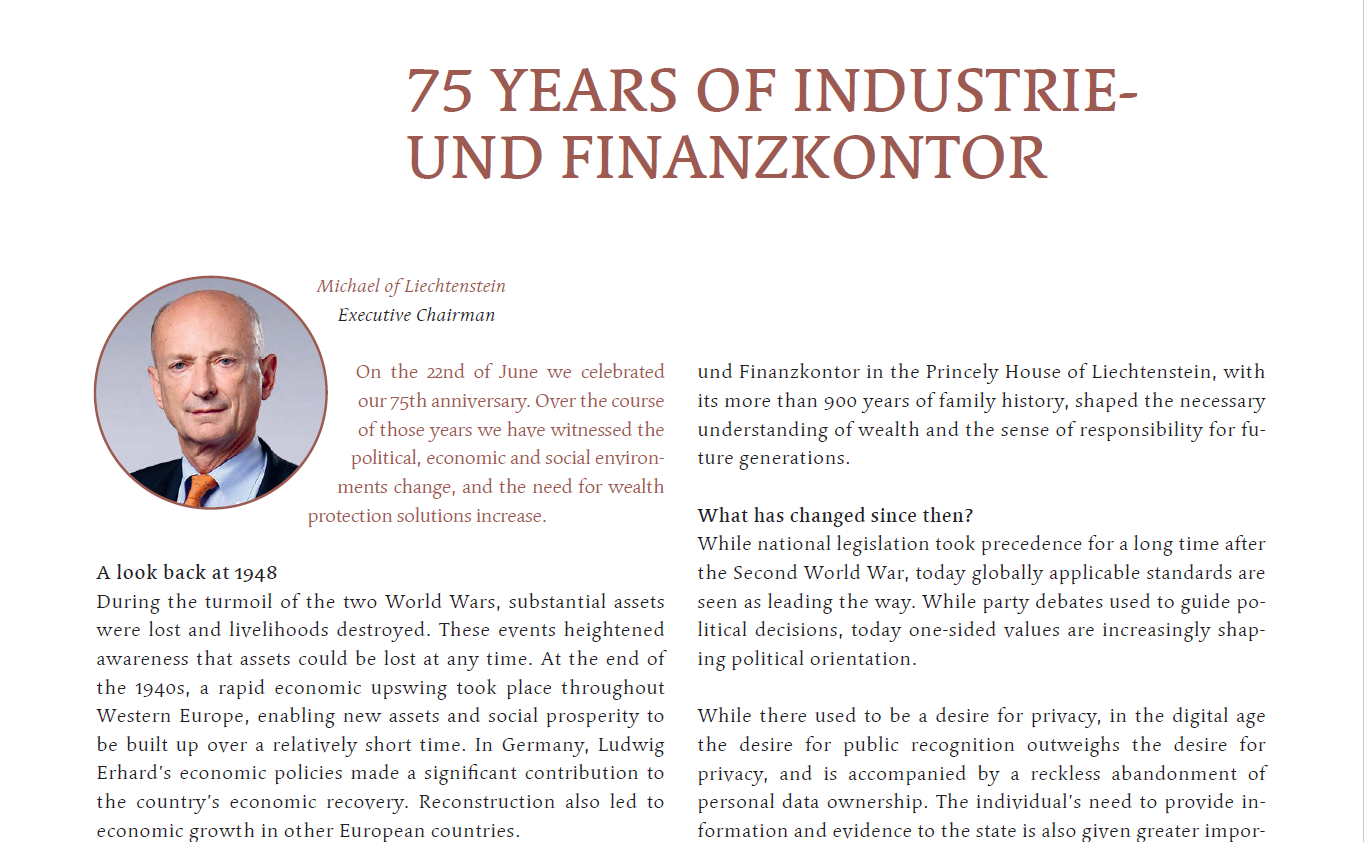
On the 22nd of June we celebrated our 75th anniversary. Over the course of those years we have witnessed the political, economic and social environments change, and the need for wealth protection solutions increase.
A look back at 1948
During the turmoil of the two World Wars, substantial assets were lost and livelihoods destroyed. These events heightened awareness that assets could be lost at any time. At the end of the 1940s, a rapid economic upswing took place throughout Western Europe, enabling new assets and social prosperity to
be built up over a relatively short time. In Germany, Ludwig Erhard’s economic policies made a significant contribution to the country’s economic recovery. Reconstruction also led to economic growth in other European countries.
On June 22nd 1948, Industrie- und Finanzkontor was registered in Liechtenstein’s Public Registry. Members of the Princely House of Liechtenstein founded the company in order to restore family assets after the end of the Second World War, and to manage them more effectively. The long-term safeguarding of assets and wealth emerged as a key issue.
Protection and safety
The Cold War was in full swing and long-term safety and peace was in doubt, despite international agreements. Scarred by the losses associated with the war years, people wanted protection for their families and protection for their assets against further loss. Liechtenstein was seen as a secure location. The foundations for this security were laid back in the 1920s:
- 1923: Liechtenstein’s Parliament enacted a business-friendly tax law
- 1924: the Swiss franc was adopted as the official national currency
- 1926: the Persons and Companies Act (PCA) took effect, and the legal form of the family foundation, which is unique in continental Europe, was introduced
In 1938 Prince Franz Josef II of Liechtenstein’s reign began. He and the government focused on Liechtenstein’s economic development, and on creating a lean, business-friendly administration. Over time, Industrie- und Finanzkontor developed into a leading service provider in the fiduciary sector, with a
strong tradition in wealth structuring to protect and preserve assets and values over the long term. The roots of Industrie- und Finanzkontor in the Princely House of Liechtenstein, with its more than 900 years of family history, shaped the necessary understanding of wealth and the sense of responsibility for future
generations.
What has changed since then?
While national legislation took precedence for a long time after the Second World War, today globally applicable standards are seen as leading the way. While party debates used to guide political decisions, today one-sided values are increasingly shaping political orientation. While there used to be a desire for privacy, in the digital age the desire for public recognition outweighs the desire for privacy, and is accompanied by a reckless abandonment of personal data ownership. The individual’s need to provide information and evidence to the state is also given greater importance.
These developments can affect the long-term protection and preservation of wealth. The level of regulation and transparency in financial matters can undermine the right to privacy and property. As a result, professional asset protection is gaining in importance.
How we see the future
For 75 years we at Industrie- und Finanzkontor have served families and entrepreneurs. We set up and manage asset structures via legal entities. We ensure that these meet current international requirements and are flexible enough to adapt to future changes. And we always take a holistic view of both the assets and the family.
The lawful protection of assets and values is a legitimate basic need. Private wealth is a prerequisite for social prosperity. Thinking in terms of generations, which is reflected in asset structures, is an expression of a great sense of responsibility towards what one has created and towards those who are to carry it on. Despite living in a world that is in a constant state of change, this attitude remains an important constant.
With this in mind, we are ready for the next 75 years. We will closely monitor developments in the various areas that influence the management of asset structures. This will allow us to evaluate the resulting opportunities and risks at an early stage and expand opportunities for asset structuring and wealth
preservation with foresight and in the best interest of our clients.
Michael of Liechtenstein . Executive Chairman